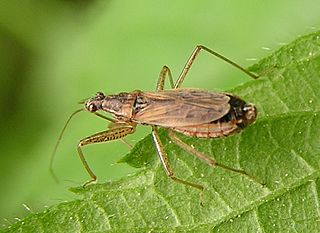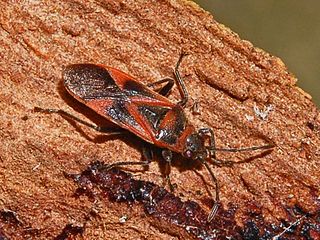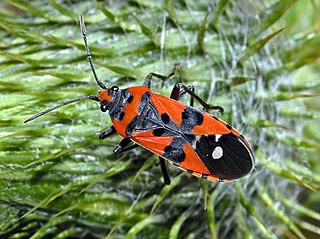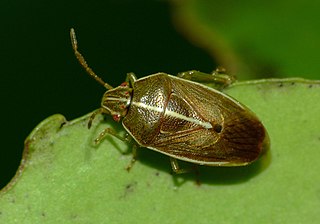
The Pentatomoidea are a superfamily of insects in the suborder Heteroptera of the order Hemiptera. As hemipterans, they possess a common arrangement of sucking mouthparts. The roughly 7000 species under Pentatomoidea are divided into 21 families. Among these are the stink bugs and shield bugs, jewel bugs, giant shield bugs, and burrower bugs.

Pentatomidae is a family of insects belonging to the order Hemiptera, generally called shield bugs or stink bugs. Pentatomidae is the largest family in the superfamily Pentatomoidea, and contains around 900 genera and over 4700 species. As hemipterans, the pentatomids have piercing sucking mouthparts, and most are phytophagous, including several species which are severe pests on agricultural crops. However, some species, particularly in the subfamily Asopinae, are predatory and may be considered beneficial.

Elasmucha grisea, common name parent bug, is a species of shield bugs or stink bugs belonging to the family Acanthosomatidae. The term parent bugs includes also the other species of the genus Elasmucha and some species of the family Acanthosomatidae.

Pentatominae is a subfamily of Pentatomidae, a family of shield bugs. This subfamily is the largest one within the Pentatomidae, having 4937 species classified in 938 genera. Species in this subfamily are phytophages and several of them are considered agricultural pests. Some invasive pentatomines such as Halyomorpha halys and Bagrada hilaris have been considered household pests. Higher systematics of the group have been revised by Rider et al.

Acanthosomatidae is a family of Hemiptera, commonly named "shield bugs" or "stink bugs". Kumar in his 1974 world revision recognized 47 genera; now this number is 55 genera, with about 200 species, and it is one of the least diverse families within Pentatomoidea. The Acanthosomatidae species are found throughout the world, being most abundant in high-latitude temperate regions and in subtropical regions at high altitudes.

Nabis is a genus of damsel bugs in the family Nabidae.

Orthops is a genus of plant bugs in the family Miridae. There are at least 30 described species in Orthops.

Graptostethus is a genus in the insect family Lygaeidae. Although originally restricted to the Old World some species like G. servus have spread to parts of the New World.

Pentatomini is a tribe of shield bugs in the subfamily of Pentatominae.

Arocatus is a genus of bugs in the family Lygaeidae.

Elasmostethus is a genus of shield bugs belonging to the family Acanthosomatidae.

Lygaeus is a genus of seed bugs in the family Lygaeidae. There are more than 60 described species in Lygaeus.

Mormidea is a genus of stink bugs in the family Pentatomidae. There are about five described species in Mormidea.
Salda is a genus of shore bugs in the family Saldidae. There are about 18 described species in Salda.

Chlorocoris is a genus of stink bugs in the family Pentatomidae. There are about six described species in Chlorocoris.

Oebalus is a genus of stink bugs in the family Pentatomidae. There are about six described species in Oebalus.

Carpocorini is a tribe of stink bugs in the family Pentatomidae. There are more than 100 genera in Carpocorini.

Rhopalimorpha is a genus of insects in the shield bug family Acanthosomatidae. It is native to Australia and New Zealand. There are four species in the genus, of which three are found in New Zealand.

Scutellera is the type genus of shield bugs in the subfamily Scutellerinae and tribe Scutellerini. Species are recorded from South and SE Asia.

















